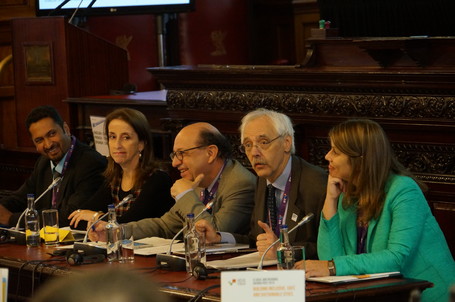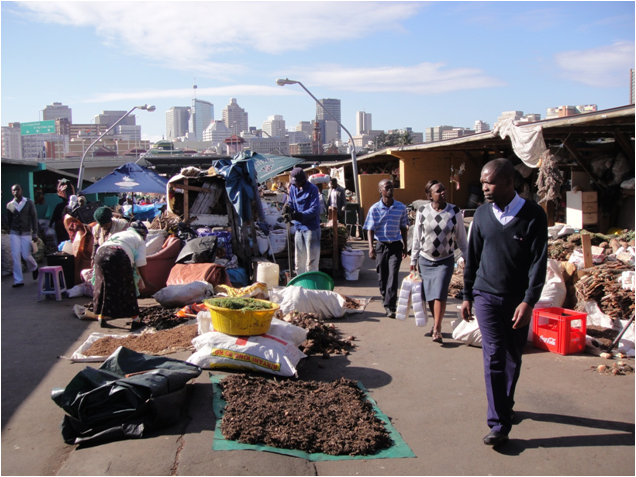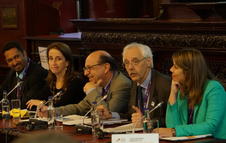
UCLG held its first Policy Debate session on 17th June 2014, dedicated to a crosscutting theme of UCLG's global agenda: Planning and Public Spaces. Participants joined this meeting, which took place within the framework of the Executive Bureau in Liverpool, to analyse two dimensions of the urban agenda: Why public spaces are so critical to human and liveable cities; and How can public spaces influence urban policies?
The aim of the session was to demonstrate the role of local urban policies in the global agenda, analysing public spaces as a crosscutting issue that demonstrate a new way to understand the city as a concentration of public goods and values: a common space with equal access to leisure, communication, expression and identity for all.
UCLG Secretary General Josep Roig chaired the meeting and introduced the dimensions of and connections between local strategies, leadership, equity and public space. Participants agreed that public spaces directly impact the lives of citizens, and as such they should be considered as public goods.
During the meeting, Puven Akkiah, representing the city of Durban, and Maria Regina de Souza, representing the city of Porto Alegre, both leading cities within the Committee on Urban Strategic Planning, provided insights on behalf of the Committee. Participants shared that there is a need to shift from a planning- to a people-centred approach. National policies need to be built from local dynamics and the public space agenda should avoid a centralized approach.
Puven Akkiah stated that public space is where all citizens, regardless of their income and personal circumstances, can feel equal and cared for. The effort of a major learning exchange that UCLG pursued in May 2014 in Durban, revealed the need to raise more awareness of what should and what can be done regarding public spaces, as well as the motivation and strategic value of the topic.
Diana Lopez from UN Habitat illustrated the work undergone by UN Habitat and the value of public space in the global planning agenda. In particular, she highlighted that UN Habitat is committed to demonstrating the value and opportunities of public space systems and streets. UN Habitat is willing to cooperate further with the UCLG Urban Strategic Planning Committee on this issue and extended an invitation to join the next expert Future of Places Conference in Buenos Aires in September.

Local elected representatives such as Greg Moore, Chair of Metro Vancouver; Roland Schaefer, Mayor of Bergkamen and First Vice-President of the German Association of Towns and Municipalities; Mr. G. S. Vicky Lumentut, Mayor of Manado; and Mr. Richard Kemp, of the Local Government Association and Councillor of Liverpool, emphasised the need to create more connections between spaces, and to better merge public and private spaces, due to rapid transformation and the necessity to differentiate public goods (grounds, parks, sports, etc.). They illustrated the immense diversity and creativity of possible actions involving communities, from pocket parks in Indonesia to affordable pianos in public spaces in Vancouver.
Experiences from South Africa were shared by Mr. Trevor Fowler, CEO of the city of Johannesburg, who stated the need to provide examples of the different forms of public spaces worldwide. He referred to the experience of the city of Johannesburg, where parks and services were located in the centre due to the apartheid system and access to public spaces was limited. The will of the current administration is to turn this around through the Corridors of Freedom project, upgrading equipment and providing new facilities, such as civic centres, a station in Soweto and public spaces in low-income neighbourhoods. He stressed that what happens internationally has an impact locally.
Finally, the World Secretariat provided a summary and some steps forward:
- UCLG will build and extend on our manifesto: the campaign for people-centred development and strong community involvement in planning at neighbourhood, city and regional levels.
- UCLG can collect practices to illustrate the 6 GOLD IV dimensions and reinforce these through learning exchange experiences and partnerships between cities, which can be applied at a local level and increase cooperation.
- UCLG will nurture and lobby for local leadership in the UN Habitat agenda on public space, advocating policies, public goods and services, and local leadership.
- Cooperation between members, organizations, institutions, committees, regional sections could improve around these topics – given such an interest and wealth of diverse experiences.
For more info read the concept note of the policy debate.











